- Home
- Sue Grafton
Q is for QUARRY Page 16
Q is for QUARRY Read online
Page 16
When she’d said it, I’d been too startled to wonder what she meant. She’d been referring to Aunt Gin, whose hard heart I’d assimilated as a substitute for love. Had she been alluding to me as well?
Once I reached my neighborhood, I spotted an Austin Healy parked in my favorite place. I did a U-turn and found a space across the street. I pushed through my squeaking gate and down the driveway to Henry’s backyard. He’d hauled his lawn furniture out of storage, hosed off the chairs, and added a set of dark green cushions with the tags still attached. Two glasses and a pitcher of iced tea rested on a small redwood table, along with a plate of homemade oatmeal cookies with raisins. At first I thought he’d meant them for me, but then I spotted him in the far comer of the yard, showing off his garden to a woman I’d never seen. The tableau bore an eerie similarity to an earlier occasion when a woman named Lila Sams had waltzed into Henry’s life.
He smiled when he saw me, gesturing me over so he could make the introductions. “Kinsey, this is Mattie Halstead from San Francisco. She stopped off to see us on her way to L.A.” And to Mattie, he said, “Kinsey rents the studio…”
“Of course. Nice to meet you. Henry’s talked quite a bit about you.”
“It’s nice meeting you, too,” I said, with a sly glance at him. He’d had his hair trimmed, and I noticed he was wearing a white dress shirt and long pants. I didn’t think he’d ever gotten that spiffed up for a woman before. Mattie was easily his height and just as trim. Her silver hair was cut short and layered in a windblown mop. She wore a white silk shirt, gray slacks, and stylish low-heeled shoes. The jewelry she wore-matching earrings and a bracelet-were custom-made, hammered silver and amethysts.
She regarded me with intelligent gray eyes. “I was afraid he might be away so I called from Carmel when I arrived there last night. I’m taking my time, stopping to see friends as I travel down the coast.”
“Is this business or pleasure?”
“A little bit of both. I’m delivering some paintings to a gallery in San Diego. I could’ve crated them for shipping, but I needed a break.”
“You were on the cruise Henry took?”
“Yes, but I’m afraid that was work. This is my time off.”
“Mattie teaches drawing and painting, and she lectures on art. Nell took her watercolor class and ended up doing quite well.”
“Better than Lewis,” Mattie said, with a smile. “I felt so bad for j him. I’ve never seen anyone quite so enthusiastic.”
“He was flirting,” Henry said reprovingly before turning to me. “Why don’t you join us? We were just about to sit down and have a glass of iced tea.”
“I better pass on that, thanks. I’ve got some reading to do and then I thought I’d sneak in a run. My schedule’s been horsed up and I owe myself one.”
“What about supper? We’re heading up to Rosie’s at six.”
“No way. I don’t intend to go until she gets off this kick of hers. Gourmet entrails. Did Henry mention that?”
“He warned me, but I’m actually a fan of liver and onions.”
“Yeah, but the liver of what beast? I won’t risk it myself. You ought to have him do the cooking. He’s terrific.”
She smiled at him. “Maybe another time. I’ve been looking forward to reconnecting with William and Rosie. They were dear.”
“How long will you be here?”
“Just one night. I have a reservation at the Edgewater, my favorite hotel. My husband and I used to come here for anniversaries,” she said. “I’ll take off in the morning as soon as it’s light. With luck, I can avoid the rush-hour traffic through Los Angeles.”
“Well, it’s too bad we won’t have time to chat. Do you plan to stop by on the return trip?”
“We’ll see how it goes. I don’t want to be a nuisance.”
“Maybe you can talk him into cooking for you then.”
I let myself into the apartment, tossed my bag on the kitchen counter, and headed up the stairs. I didn’t have any reading to catch up on and I’d done my three-mile run at six A.M. I told those tiny fibs to make sure Mattie and Henry had some time alone. I peered out the bathroom window, taking in the truncated view of the two of them down below. It was not quite four o’clock. I managed to kill an hour and a half and then thought about where to go for supper that night. I was serious about boycotting Rosie’s until she abandoned her newfound passion for animal by-product cookery. As it was currently Happy Hour, I knew Dolan would be at CC’s. I could have joined him, but I didn’t want to sit and count his drinks while inhaling his secondhand smoke. I returned to the bathroom window and peered down at the backyard. Henry and Mattie were gone, but their two lawn chairs remained, pulled slightly closer together than they’d been when I’d first arrived home. I could see the lights on in his kitchen, so they were probably fortifying themselves with Black Jack on ice before braving Rosie’s food.
Now that the coast was clear, I grabbed my shoulder bag and a jacket and scooted out the front door. I retrieved my car and drove to the McDonald’s on lower Milagra Street. I’m at the drive-through lane so often, the take-out servers recognize my voice and deal with me by name. On impulse, I ordered extras and went to Stacey’s house. In my opinion, there’s no condition in life that can’t be ameliorated by a dose of junk food.
When I knocked on his screen door, I could see him perched on a cardboard carton in the living room. His desk drawers were open and a shredder was plugged into an extension cord that trailed across the room. He motioned me in.
I held up the white bag. “I hope you haven’t eaten supper. I’ve got Cokes, french fries, and Quarter Pounders with Cheese. Very nourishing.”
“I don’t have much appetite, but I’ll be happy to keep you company.”
“Fair enough.” I left the bag on the desk and moved into the kitchen where I found a package of paper plates and a roll of paper towels. I returned to the living room, put the dinnerware on the floor, and hauled over two boxes from the stack against the wall. I sat on one box and used the second as a table that I arranged between us. I unpacked Cokes, two large cartons of fries, packets of ketchup and salt, and a paper-wrapped QP with Cheese for each of us. I squeezed ketchup on the fries, salted everything in sight, and then downed my QP in approximately eight bites. “I’m going for the land speed record here.”
Stacey lifted the top of his bun and eyed his burger with misgivings.
“I’ve never eaten one of these.”
I paused in the midst of wiping my mouth. “You’re joking.”
“I’m not.” He tried a cautious bite, which he chewed with suspicion, letting the flavors mingle in his mouth. He wagged his head from side to side. With his second bite, he seemed to get the hang of it, and after that he ate with the same dispatch I did.
I reached into the bag and took out another burger that I passed to him. This time, halfway through, a nearly subliminal moan escaped his lips. I laughed.
“Where’d you get that?” I asked, pointing to the shredder with a french fry.
“Fellow next door,” he said, pausing to swallow his bite. “I’m cleaning out my desk. Can’t quite bring myself to shred my receipts. I don’t intend to file a tax return. I figure I’ll be dead before the IRS catches up with me. Even so, I worry about an audit without the proper paperwork on hand.” He licked his fingers and wiped his mouth. “Thank you. That was great. I haven’t had an appetite for weeks.”
“Happy to help.” He gathered all the trash and put it back in the bag, then turned and made a free throw, tossing it in the wastebasket. He reached into the bottom drawer and took out a cardboard box filled with black-and-white photographs. He set the box in his lap, picked up a handful, and fed them to the machine.
I watched while six images were reduced to slivers. “What are you doing?”
“I told you. Cleaning out my desk.”
“But those are family photographs. You can’t do that.”
“Why not? I’m the only one left.”
“But you can’t just destroy them. I can’t believe you’d do that.”
“Why leave the job for someone else? At least if I do it, there’s a personal connection.” He sang, “Good-bye, Uncle Schmitty. Bye I Cousin Mortimer…” Two more images were converted to confetti in the shredder bin.
I put a hand on his arm. “I’ll take them.”
“And do what? You don’t even know these folks. I can’t identify the better half of’ em myself. Look at this. Who’s he? I swear I never saw this guy before in my life. Must have been a family friend.” He touched the edge of the photo to the shredder teeth and watched it disappear before he picked up the next.
“Don’t shred them. Aren’t those your parents?”
“Sure, but they’ve been dead for years.”
“I can’t stand this. Give me those. I’ll pretend they’re mine.”
“Don’t be ridiculous. You’re alone just like me. HI let you take ‘em, someone else will end up throwing them in your trash.”
“So what? Come on, Stace. Please.”
He hesitated and finally nodded. “Okay. But it’s dumb.”
He handed me the box of photos, which I placed near my bag out of his reach. I was worried he’d change his mind and shred someone else. He turned his attention to a file folder marked AUTO INSURANCE and fed its contents into the shredder. Idly, he said, “I almost forgot to mention, Joe Mandel called with an address for Iona Mathis. She’s living in the high desert, little town called Peaches.”
“Which is where?”
“Above San Bernardino, off Highway 138. There’s no phone in her name so she might be bunking in with someone else. Did I tell you Mandel got a line on the red Mustang? This guy Gant, the original owner, died about ten years ago, but his widow says the car was stolen from an auto upholstery shop in Quorum, California, where he’d taken it to get the seats replaced. Gant had the car towed back from Lompoc, but it was such a mess he turned around and sold it to the guy whose shop it was stolen from an auto upholstery shop in Quorum, California, where he’d taken it to get the seats replaced. Gant had the car towed back fro Lompoc, but it was such a mess that he turned around and sold it to the guy whose shop it was stolen from – fellow named Ruel McPhee. According to our sources, the car’s now registered to him. I’ve left him four messages, but so far I haven’t heard back. Con thinks it’s worth a trip down there just to see what’s what.”
“Where’s Quorum? I’ve never heard of it.”
“Well, neither had I, but Con says it’s just south of Blythe near the Arizona line. Now here’s the kicker on that. Turns out Frankie Miracle grew up in Quartzsite, Arizona, which is just a few miles from Blythe in the same neck of the woods. Con wants to take a detour through Peaches and talk to Iona Mathis on his way to Quorum.”
“When?”
“Tomorrow morning he says. I thought I better warn you in case you want to make up an excuse.”
“Not at all. I’ll go. I could use a change of scene. What about you? Are you feeling up to it?”
“You two go on. I’ll wait and see what the doc has to say. They may want me back in the hospital for the third time this month. Talk about tedious.”
“How’re you holding up?”
“I’m not thrilled with this new development, but I don’t see that I have much choice.”
“I’ll hold good thoughts for you.”
“I could use a few,” he said. He hesitated. “This may be out of line, but I’m wondering if Con’s told you about his wife’s suicide.”
“I knew she had cancer, but he never said a word.”
“That’s why he gets so pissy on the subject. He thinks he could have saved her.”
“Could he?”
“Of course not. When it comes right down to it, you can’t save anyone except yourself. Sometimes, you can’t even do that. Anyway, I thought you should know.”
He smiled to himself for reasons I suspect were unrelated to me. I watched while his army discharge papers disappeared into the shredder with a grinding sound.
Chapter 12
*
My packing for the trip took all of five minutes. At most, I figured we’d be gone for two days, which meant a toothbrush, toothpaste, two clean Tshirts, a sweatshirt, two pairs of socks, four pairs of underpants, and the oversized T-shirt I sleep in. I shoved it all into a duffel the size of a bolster pillow. Since I was wearing jeans and my Sauconys, the only other items I’d need were my running sweats, my windbreaker, and my little portable Smith-Corona. Dolan had opted for an early start, which I in his terms translated to a 9:30 departure. This gave me time to sneak in a three-mile run, followed by a supersetting weight session at the gym. I was racking up virtue points in case I didn’t have the chance to exercise while I was on the road.
By the time Dolan pulled up, I was sitting on the curb, reading a paperback novel with my shoulder bag, typewriter, and duffel. At my side, I had two rubber-band-bound stacks of index cards in my bag. He must have run his vehicle through a car wash because the exterior was clean and the floorboards were free of gas receipts and discarded fast-food wrappers. Now that we were cohorts, he didn’t feel required to escort me around the car and let me in. I hauled the door open, while he reached over the seat and shoved his suitcase to one side. “You can put your things back there with mine unless you’d rather leave ‘em in the trunk.”
“This is fine.” I tucked my Smith-Corona on the floor, tossed my duffel in the rear seat, and got in. I tried hauling the door shut, but the hinges responded sluggishly and refused to budge. Dolan finally reached across me and gave the door a yank. It closed with a thunk. I wrestled with the seat belt, jerking until I’d pulled sufficient length to reach the catch and snap it down. I spotted a fresh pack of cigarettes on the dash. “I hope you don’t intend to smoke.”
“Not with the windows closed.”
“You are so considerate. You have a map?”
“In the side pocket. I thought we’d go the back way. I’d take the 101 to the 405 and hit the 5 from there, but I with my bum ticker, I don’t want to risk the freeway in case I die at the wheel.”
“You’re really making me feel good about this.”
Dolan turned onto the 101 heading south while I flapped at the California map and refolded it into a manageable size. By my estimate, Peaches was ninety miles away, roughly an hour and a half. Happily, Dolan didn’t like chitchat any more than I did. I sat and stared out the window, wondering if love would blossom between Henry and Mattie.
The coastline looked smoky. There was a harsh light on the ocean, but the surf was calm, advancing toward the shore in long, smooth undulations. The islands were barely visible twenty-six miles offshore. Steep hills sloped down to the highway, the chaparral a dark mossy green, flourishing after a wet autumn and the long damp winter months.
In many sections of the hillside, the vegetation had been overtaken by thick patches of cactus shaped like Ping-Pong paddles, abristle with thorns. I’ve always thought California prisons could discourage escape by seeding the surrounding landscape with vicious plants.
Missing prisoners could be located by their howls of dismay and could spend their stay in solitary confinement picking thorns out of their heiniebumpers.
After twenty minutes, I glanced at Dolan. “You have kids?”
“Naw. Grace used to talk about it, but it didn’t interest me. Kids change your life. We were fine as is.”
“Any regrets?”
“I don’t spend a lot of time on regrets. How about you? Are you planning to have kids?”
“I can’t quite picture it, but I won’t rule it out. I’m not exactly famous for my relationships with men.”
At Perdido, we caught the 126 heading inland. The power lines disappeared. There was a dusting of snow on the distant mountain peaks, an odd contrast to the vivid green in the fields below. In the citrus groves, oranges hung on the trees like Christmas ornaments. The road-side fruit stands were boarded up, but they’d
be open for business in another month or so. We passed through two small agricultural communities that hadn’t changed in years. This section of the road was known as Blood Alley: only two lanes wide with an occasional passing lane in which the fiery crashes usually occurred. I kept a close eye on Dolan in the event he was on the verge of conking out on me.
He said, “Quit worrying.”
At Palmdale, we turned east off Highway 14, picking up the 18. Ancient, cranky-looking billboards indicated land for sale. I saw a sign for 213th Street with a dirt road shooting off to a vanishing point. We passed a hand-painted sign that read PAIRALEGALS AVAILABLE: WILLS, CONTRACTS, DIVORCES, NOTER REPUBLIC. According to the map, the road we were on skirted the western border of the Mojave Desert at an altitude of 4,500 feet.
I checked the map again and said, “Wow. I never understood the size of the Mojave. It’s really big.”
“Twenty-five thousand square miles if you include the portions in Nevada, Arizona, and Utah. You know much about the desert?”
“I’ve picked up the occasional odd fact, but that’s about it.”
“I’ve been reading about scorpions. Book claims they’re the first air-breathing animal. They have a rudimentary brain, but their eyesight’s poor. They probably don’t perceive anything they can’t actually touch first. You see two scorpions together, they’re either making love or one of them is being eaten by the other. There’s a lesson in there somewhere, but I can’t figure out what. Probably has to do with the nature of true love.”
I don’t know why, but the information made me smile. We passed a sign that read PEACHES, POP. 897. The town was marked by a scattering of Joshua trees and was notable for its abundance of abandoned businesses. The San Gabriel Mountains loomed on our right, antiqued with snow, which had settled into all the crevices, defining them in white. Timbers formed a windbreak along the crest, while below them, I could see stands of evergreens laden with white. A freak spring storm had left mounds and patches of aging snow on the ground. Five cars had pulled over and parked on the berm where five sets of parents stood by chatting while their respective children played in the drifts. Most of the kids looked underdressed. As with the ocean, they’d frolic in the elements until their teeth were chattering and their lips had turned blue.

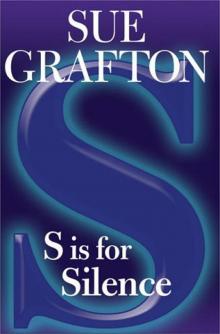 S Is for Silence
S Is for Silence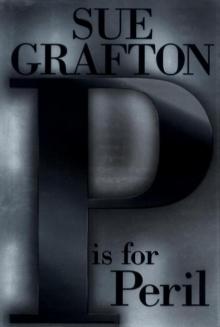 P Is for Peril
P Is for Peril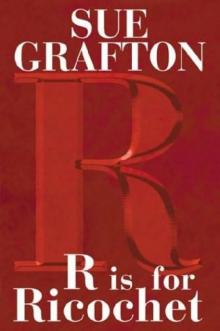 R Is for Ricochet
R Is for Ricochet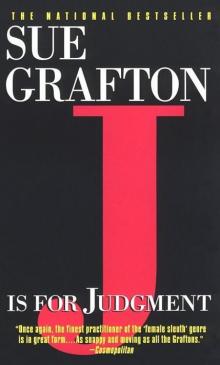 J Is for Judgment
J Is for Judgment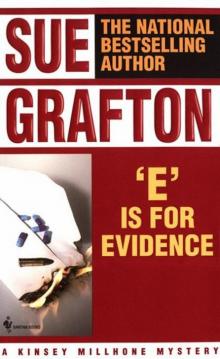 E Is for Evidence
E Is for Evidence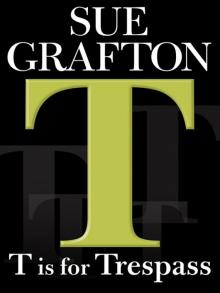 T Is for Trespass
T Is for Trespass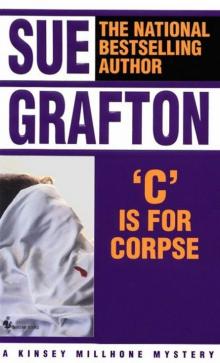 C Is for Corpse
C Is for Corpse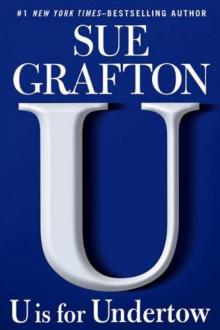 U Is for Undertow
U Is for Undertow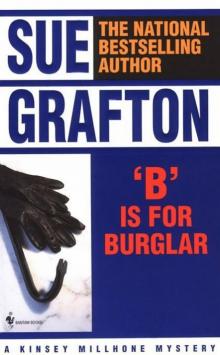 B Is for Burglar
B Is for Burglar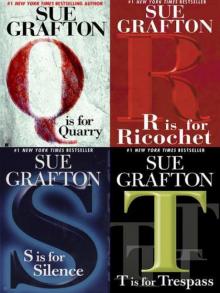 Four Sue Grafton Novels
Four Sue Grafton Novels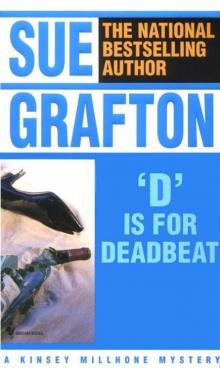 D Is for Deadbeat
D Is for Deadbeat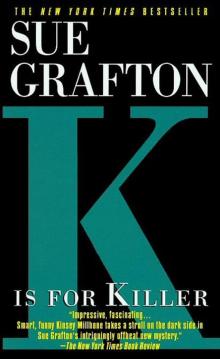 K Is for Killer
K Is for Killer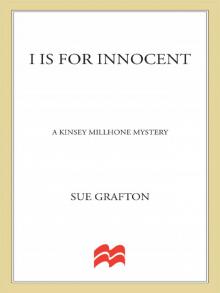 I Is for Innocent
I Is for Innocent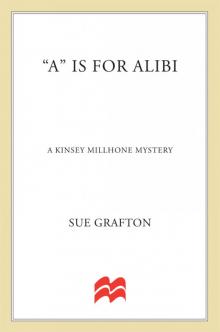 A Is for Alibi
A Is for Alibi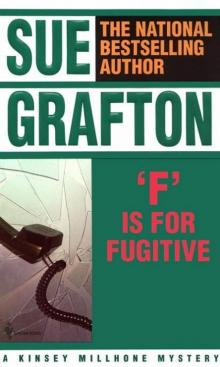 F Is for Fugitive
F Is for Fugitive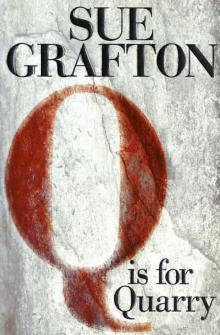 Q Is for Quarry
Q Is for Quarry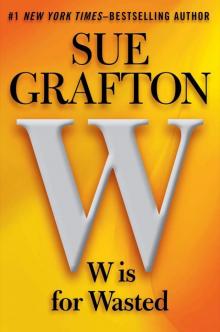 W Is for Wasted
W Is for Wasted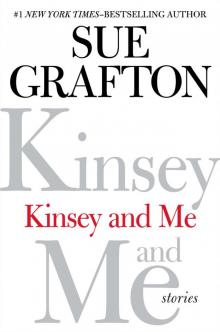 Kinsey and Me: Stories
Kinsey and Me: Stories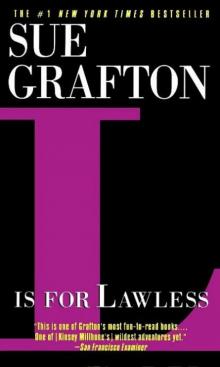 L Is for Lawless
L Is for Lawless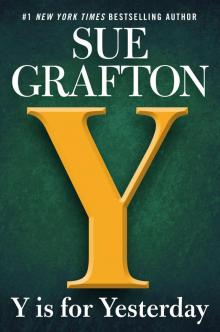 Y Is for Yesterday
Y Is for Yesterday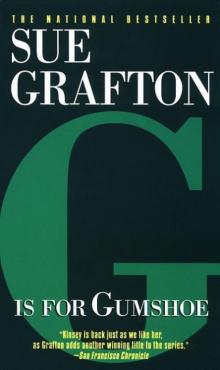 G Is for Gumshoe
G Is for Gumshoe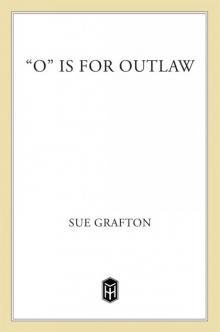 O Is for Outlaw
O Is for Outlaw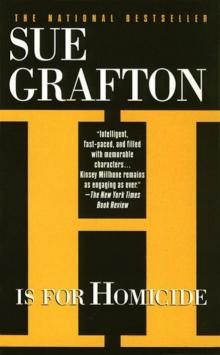 H Is for Homicide
H Is for Homicide X
X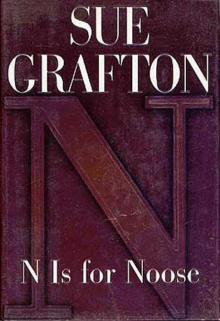 N Is for Noose
N Is for Noose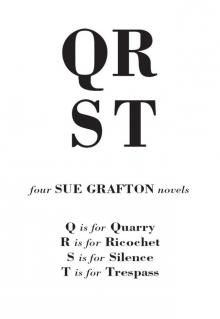 Three Complete Novels: A Is for Alibi / B Is for Burglar / C Is for Corpse
Three Complete Novels: A Is for Alibi / B Is for Burglar / C Is for Corpse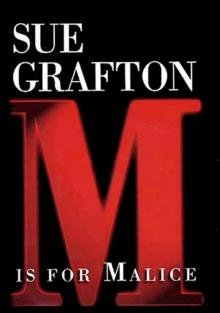 M Is for Malice
M Is for Malice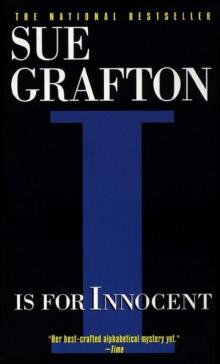 I is for INNOCENT
I is for INNOCENT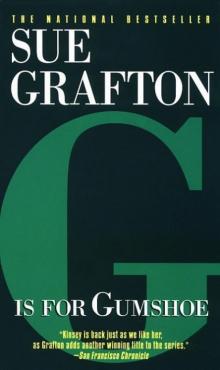 G is for GUMSHOE
G is for GUMSHOE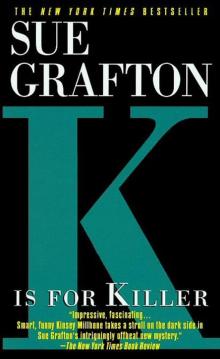 K is for KILLER
K is for KILLER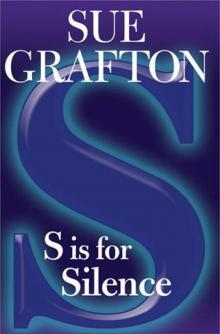 S is for SILENCE
S is for SILENCE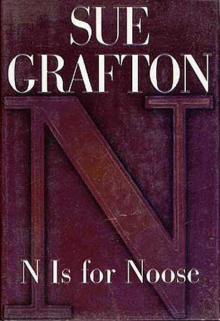 N is for NOOSE
N is for NOOSE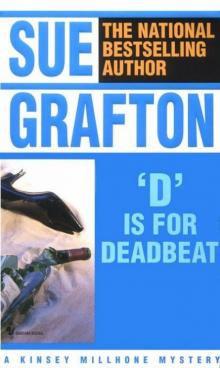 D is for DEADBEAT
D is for DEADBEAT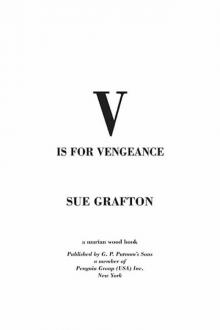 V is for Vengeance
V is for Vengeance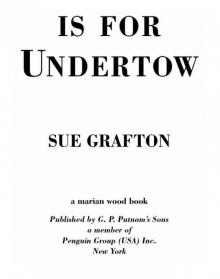 U is for Undertow
U is for Undertow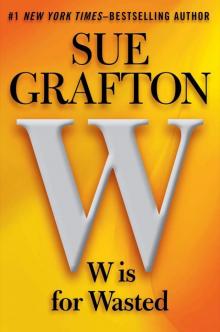 W Is for Wasted km-23
W Is for Wasted km-23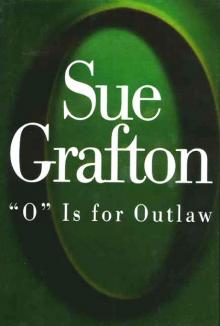 O is for OUTLAW
O is for OUTLAW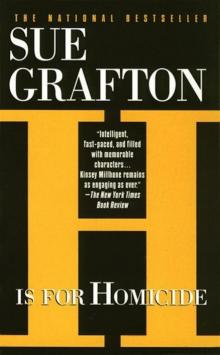 H is for HOMICIDE
H is for HOMICIDE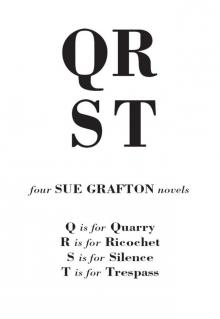 Sue Grafton Novel Collection
Sue Grafton Novel Collection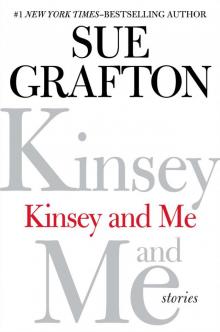 Kinsey and Me
Kinsey and Me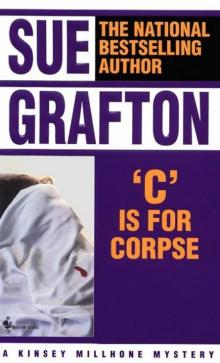 C is for CORPSE
C is for CORPSE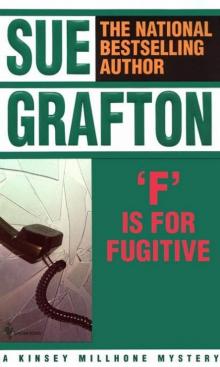 F is for FUGITIVE
F is for FUGITIVE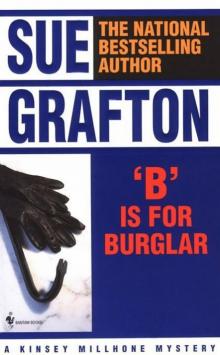 B is for BURGLAR
B is for BURGLAR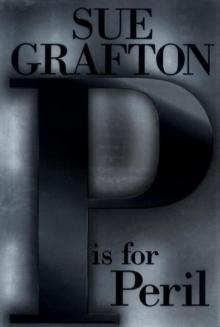 P is for PERIL
P is for PERIL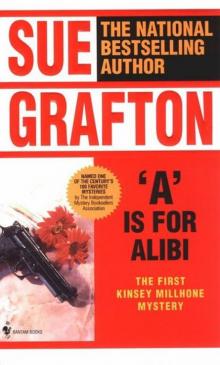 A is for ALIBI
A is for ALIBI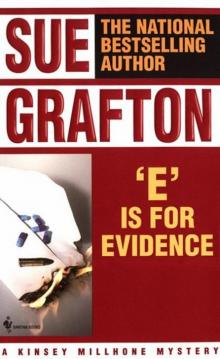 E is for EVIDENCE
E is for EVIDENCE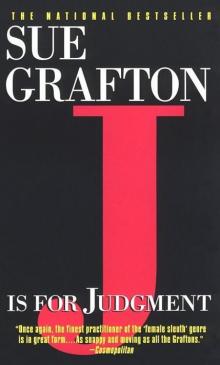 J is for JUDGMENT
J is for JUDGMENT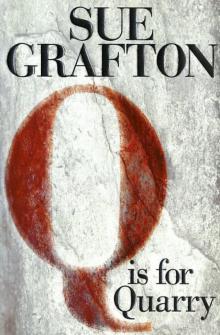 Q is for QUARRY
Q is for QUARRY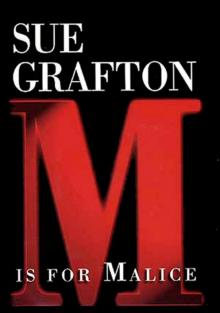 M is for MALICE
M is for MALICE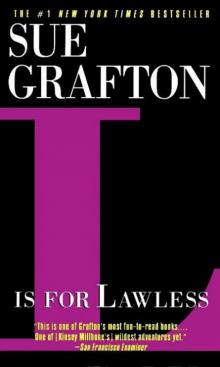 L is for LAWLESS
L is for LAWLESS